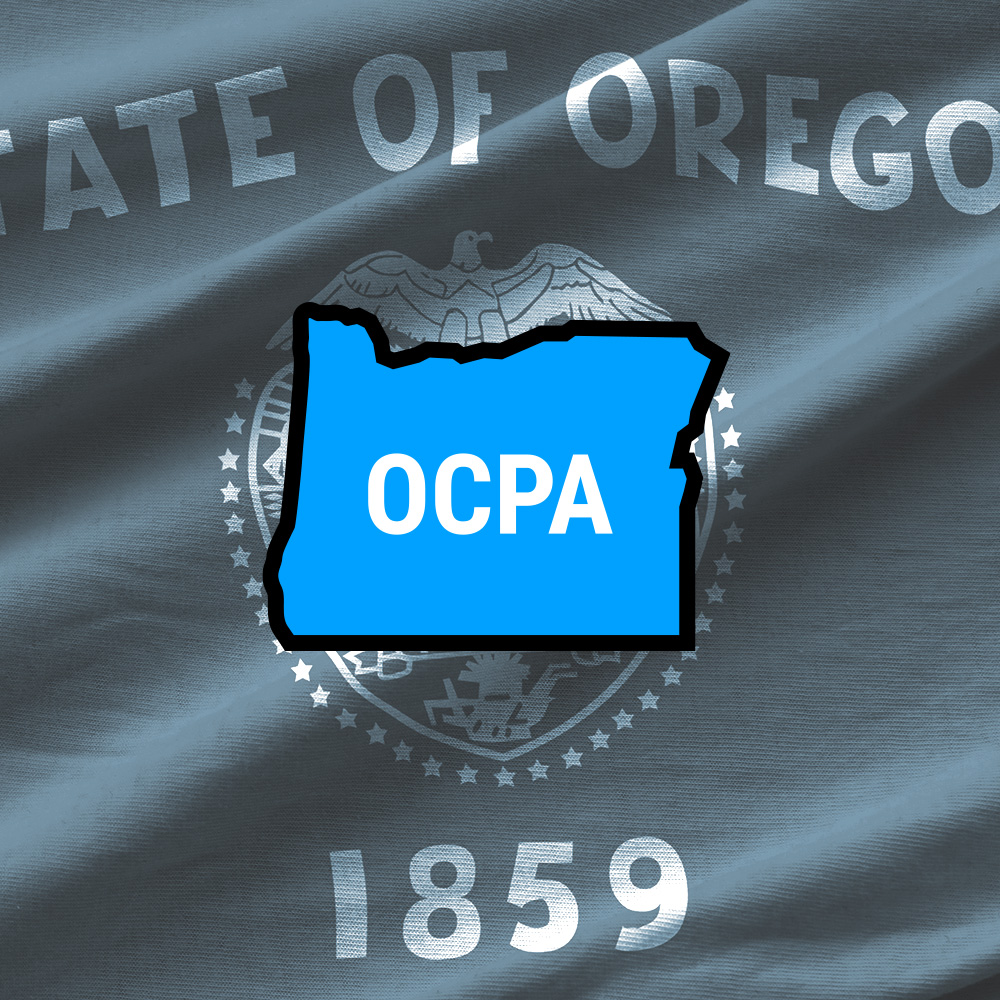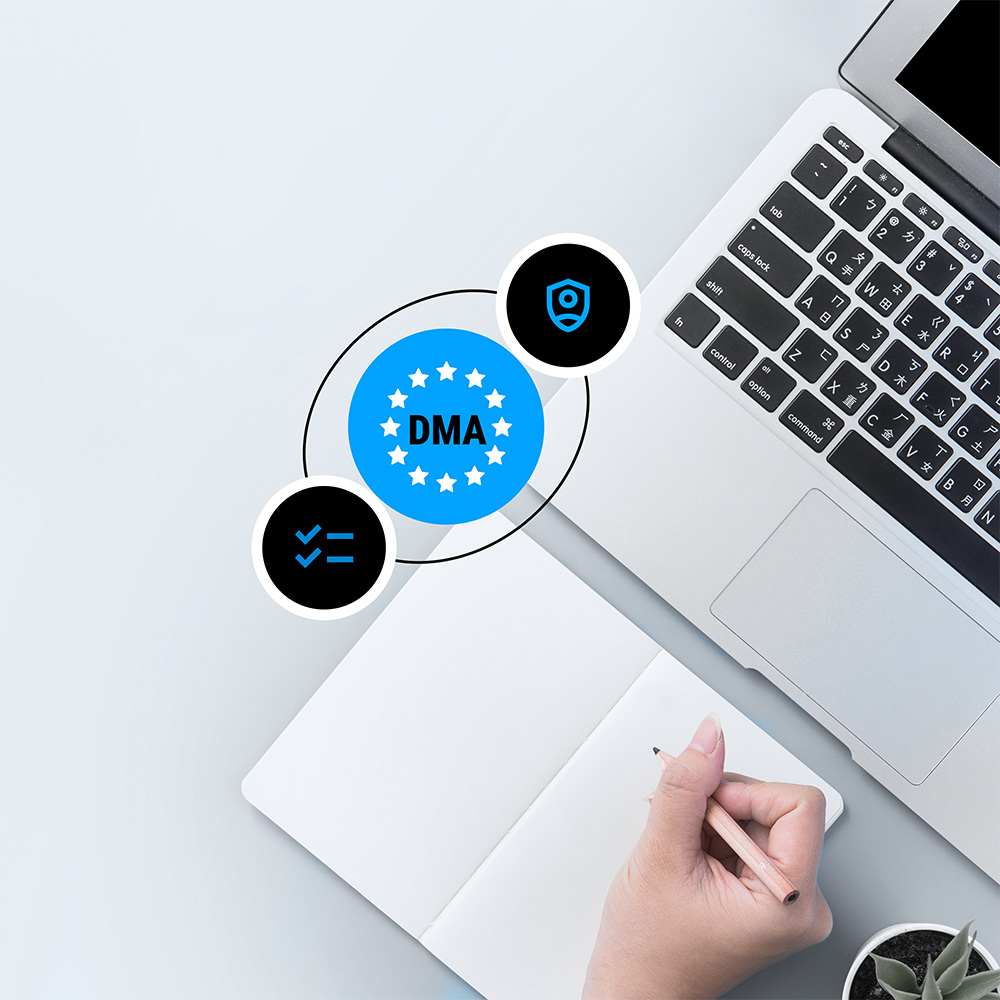Oregon was the twelfth state in the United States to pass comprehensive data privacy legislation with SB 619. Governor Tina Kotek signed the bill into law on July 18, 2023, and the Oregon Consumer Privacy Act (OCPA) came into effect for most organizations on July 1, 2024. Nonprofits have an extra year to prepare, so their compliance is required as of July 1, 2025.
In this article, we’ll look at the Oregon Consumer Privacy Act’s requirements, who they apply to, and what businesses can do to achieve compliance.
What is the Oregon Consumer Privacy Act (OCPA)?
The Oregon Consumer Privacy Act protects the privacy and personal data of over 4.2 million Oregon residents. The law establishes rules for any individual or entity conducting business in Oregon or those providing goods and services to its residents and processing their personal data. Affected residents are known as “consumers” under the law.
The OCPA protects Oregon residents’ personal data when they act as individuals or in household contexts. It does not cover personal data collected in a work context. This means information about individuals acting in their professional roles, rather than as consumers, is not covered under this law.
Consistent with the other US state-level data privacy laws, the OCPA requires businesses to inform residents about how their personal data is collected and used. This notification — usually included in a website’s privacy policy — must cover key details such as:
- What data is collected
- How the data is used
- Whether the data is shared and with whom
- Information about consumers’ rights
The Oregon privacy law uses an opt-out consent model, which means that in most cases, organizations can collect consumers’ personal data without prior consent. However, they must make it possible for consumers to opt out of the sale of their personal data and its use in targeted advertising or profiling. The law also requires businesses to implement reasonable security measures to protect the personal data they handle.
Who must comply with the Oregon Consumer Privacy Act (OCPA)?
Similar to many other US state-level data privacy laws, the OCPA establishes thresholds for establishing which organizations must comply with its requirements. However, unlike some other laws, it does not contain a revenue-only threshold.
To fall under the OCPA’s scope, during a calendar year an organization must control or process the personal data of:
- 100,000 consumers, not including consumers only completing payment transactionsor
or
- 25,000 consumers if 25 percent or more of the organization’s annual gross revenue comes from selling personal data
Exemptions to OCPA compliance
The OCPA is different from some other data privacy laws because many of its exemptions focus on the types of data being processed and what processing activities are being conducted, rather than just on the organizations themselves.
For example, instead of exempting healthcare entities under the Health Insurance Portability and Accountability Act (HIPAA), the OCPA exempts protected health information handled in compliance with HIPAA. This means protected health information is outside of the OCPA’s scope, but other data that a healthcare organization handles could still fall under the law. Organizations that may be exempt from compliance with other state-level consumer privacy laws should consult a qualified legal professional to determine if they are required to comply with the OCPA.
Exempted organizations and their services or activities include:
- Governmental agencies
- Consumer reporting agencies
- Financial institutions regulated by the Bank Act and their affiliates or subsidiaries, provided they focus exclusively on financial activities
- Insurance companies
- Nonprofit organizations established to detect and prevent insurance fraud
- Press, wire, or other information services (and the non-commercial activities of media entities)
Personal data collected, processed, sold, or disclosed under the following federal laws is also exempt from the OCPA’s scope:
- Health Insurance Portability and Accountability Act (HIPAA)
- Gramm-Leach-Bliley Act (GLBA)
- Health Care Quality Improvement Act
- Fair Credit Reporting Act (FCRA)
- Driver’s Privacy Protection Act
- Family Educational Rights and Privacy Act (FERPA)
- Airline Deregulation Act
Definitions in the Oregon Consumer Privacy Act (OCPA)
This Oregon data privacy law defines several key terms related to the data it protects and relevant data processing activities.
What is personal data under the OCPA?
The Oregon privacy law protects consumers’ personal data, which it defines as “data, derived data or any unique identifier that is linked to or is reasonably linkable to a consumer or to a device that identifies, is linked to or is reasonably linkable to one or more consumers in a household.”
The law specifically excludes personal data that is:
- Deidentified data
- made legally available through government records or widely distributed media
- made public by the consumer
The law does not specifically list what constitutes personal data. Common types of personal data that businesses collect include a consumer’s name, phone number, email address, Social Security Number, or driver’s license number.
It should be noted that personal data (also called personal information under some state privacy laws) and personally identifiable information are not always the same thing, and distinctions between the two are often made in data privacy laws.
What is sensitive data under the OCPA?
Sensitive data is personal data that requires special handling because it could cause harm or embarrassment if misused or unlawfully accessed. It refers to personal data that would reveal an individual’s:
- Racial or ethnic background
- National origin
- Religious beliefs
- Mental or physical condition or diagnosis
- Genetic or biometric data
- Sexual orientation
- Status as transgender or non-binary
- Status as a victim of crime
- Citizenship or immigration status
- Precise present or past geolocation (within 1,750 feet or 533.4 meters)
All personal data belonging to children is also considered sensitive data under the OCPA.
Oregon’s law is the first of the US privacy laws to include either transgender or non-binary gender expression or the status as a victim of crime as sensitive data. The definition of biometric data excludes facial geometry or mapping unless it is done for the purpose of identifying an individual.
An exception to the law’s definition of sensitive data includes “the content of communications or any data generated by or connected to advanced utility metering infrastructure systems or equipment for use by a utility.” In other words, the law does not consider sensitive information to include communications content, like that in emails or messages, or data generated by smart utility meters and related systems used by utilities.
What is consent under the OCPA?
Like many other data privacy laws, the Oregon data privacy law follows the European Union’s General Data Protection Regulation (GDPR) regarding the definition of valid consent. Under the OCPA, consent is “an affirmative act by means of which a consumer clearly and conspicuously communicates the consumer’s freely given, specific, informed and unambiguous assent to another person’s act or practice…”
The definition also includes conditions for valid consent:
- the consumer’s inaction does not constitute consent
- the user interface used to request consent must not attempt to obscure, subvert, or impair the consumer’s choice
These conditions are highly relevant to online consumers and reflect that the use of manipulative dark patterns are increasingly frowned upon by data protection authorities, and increasingly prohibited. The Oregon Department of Justice (DOJ) website also clarifies that the use of dark patterns may be considered a deceptive business practice under Oregon’s Unlawful Trade Practices Act.
What is processing under the OCPA?
Processing under the OCPA means any action or set of actions performed on personal data, whether manually or automatically. This includes activities like collecting, using, storing, disclosing, analyzing, deleting, or modifying the data.
Who is a controller under the OCPA?
The OCPA uses the term “controller” to describe businesses or entities that decide how and why personal data is processed. While the law uses the word “person,” it applies broadly to both individuals and organizations.
The OCPA definition of controller is “a person that, alone or jointly with another person, determines the purposes and means for processing personal data.” In simpler terms, a controller is anyone who makes the key decisions about why personal data is collected and how it will be used.
Who is a processor under the OCPA?
The OCPA defines a processor as “a person that processes personal data on behalf of a controller.” Like the controller, while the law references a person, it typically refers to businesses or organizations that handle data for a controller. Processors are often third parties that follow the controller’s instructions for handling personal data. These third parties can include advertising partners, payment processors, or fulfillment companies, for example. Their role is to carry out specific tasks without deciding how or why the data is processed.
What is profiling under the OCPA?
Profiling is increasingly becoming a standard inclusion in data privacy laws, particularly as it can relate to “automated decision-making” or the use of AI technologies. The Oregon privacy law defines profiling as “an automated processing of personal data for the purpose of evaluating, analyzing or predicting an identified or identifiable consumer’s economic circumstances, health, personal preferences, interests, reliability, behavior, location or movements.”
What is targeted advertising under the OCPA?
Targeted advertising may involve emerging technologies like AI tools. It is also becoming a standard inclusion in data privacy laws. The OCPA defines targeted advertising as advertising that is “selected for display to a consumer on the basis of personal data obtained from the consumer’s activities over time and across one or more unaffiliated websites or online applications and is used to predict the consumer’s preferences or interests.” In simpler terms, targeted advertising refers to ads shown to a consumer based on their interests, which are determined by personal data that is collected over time from different websites and apps.
However, some types of ads are excluded from this definition, such as those that are:
- Based on activities within a controller’s own websites or online apps
- Based on the context of a consumer’s current search query, visit to a specific website, or app use
- Shown in response to a consumer’s request for information or feedback
The definition also excludes processing of personal data solely to measure or report an ad’s frequency, performance, or reach.
What is a sale under the OCPA?
The OCPA defines sale as “the exchange of personal data for monetary or other valuable consideration by the controller with a third party.” This means a sale doesn’t have to involve money. Any exchange of data for something of value, even if it’s non-monetary, qualifies as a sale under the law.
The Oregon privacy law does not consider the following disclosures of personal data to be a “sale”:
- Disclosures to a processor
- Disclosures to an affiliate or a third party to help the controller provide a product or service requested by the consumer
- Disclosures or transfers of personal data as part of a merger, acquisition, bankruptcy, or similar transaction in which a third party takes control of the controller’s assets, including personal data
- Disclosures of personal data that occur because the consumer:
- directs the controller to disclose the data
- intentionally discloses the data while directing the controller to interact with a third party
- intentionally discloses the data to the public, such as through mass media, without restricting the audience
Consumers’ rights under the Oregon Consumer Privacy Act (OCPA)
The Oregon privacy law grants consumers a range of rights over their personal data, comparable to other US state-level privacy laws.
- Right to access: consumers can request confirmation of whether their personal data is being processed and the categories of personal data being processed, gain access to the data, and receive a list of the specific third parties it has been shared with (other than natural persons), all subject to some exceptions.
- Right to correction: consumers can ask controllers to correct inaccurate or outdated information they have provided.
- Right to deletion: consumers can request the deletion of their personal data held by a controller, with some exceptions.
- Right to portability: consumers can obtain a copy of the personal data they have provided to a controller, in a readily usable format, with some exceptions.
- Right to opt out: consumers can opt out of the sale of their personal data, targeted advertising, or profiling used for decisions with legal or similarly significant effects.
Consumers can designate an authorized agent to opt out of personal data processing on their behalf. The OCPA also introduces a requirement for controllers to to recognize universal opt-out signals, further simplifying the opt-out process.
This Oregon data privacy law stands out by giving consumers the right to request a specific list of third parties that have received their personal data. Unlike many other privacy laws, this one requires controllers to maintain detailed records of the exact entities they share data with, rather than just general categories of recipients.
Children’s personal data has special protections under the OCPA. Parents or legal guardians can exercise rights for children under the age of 13, whose data is classified as sensitive personal data and subject to stricter rules. For minors between 13 and 15, opt-in consent is required for specific processing activities, including its use for targeted advertising or profiling. “Opt-in” means that explicit consent is required before the data can be used for these purposes.
Consumers can make one free rights request every 12 months, to which an organization has 45 days to respond. They can extend that period by another 45 days if reasonably necessary. Organizations can deny consumer requests for a number of reasons. These include cases in which the consumer’s identity cannot reasonably be verified, or if the consumer has made too many requests within a 12-month period.
Oregon’s privacy law does not include private right of action, so consumers cannot sue data controllers for violations. California remains the only state that allows this provision.
What are the privacy requirements under the Oregon Consumer Privacy Act (OCPA)
Controllers must meet the following OCPA requirements to protect the personal data they collect from consumers.
Privacy notice and transparency under the OCPA
The Oregon privacy law requires controllers to be transparent about their data handling practices. Controllers must provide a clear, easily accessible, and meaningful privacy notice for consumers whose personal data they may process. The privacy notice, also known as the privacy policy, must include the following:
- Purpose(s) for processing personal data
- Categories of personal data processed, including the categories of sensitive data
- Categories of personal data shared with third parties, including categories of sensitive data
- Categories of third parties with which the controller shares personal data and how each third party may use the data
- How consumers can exercise their rights, including:
- How to opt out of processing for targeted advertising or profiling
- How to submit a consumer rights request
- How to appeal a controller’s denial of a rights-related request
- The identity of the controller, including any business name the controller uses or has registered in Oregon
- At least one actively monitored online contact method, such as an email address, for consumers to directly contact the organization
- A “clear and conspicuous description” for any processing of personal data for the purpose of targeted advertising or profiling “in furtherance of decisions that produce legal effects or effects of similar significance”
According to the Oregon DOJ website, the third-party categories requirement must strike a particular balance. It should offer consumers meaningful insights into the relevant types of businesses or processing activities, without making the privacy notice overly complex. Acceptable examples include ”analytics companies,” “third-party advertisers,” and ”payment processors,” among others.
The privacy notice or policy must be easy for consumers to access. It is typically linked in the website footer for visibility and accessibility from any page.
Data minimization and purpose limitation under the OCPA
The OCPA requires controllers to limit the personal data they collect to only what is “adequate, relevant, and reasonably necessary” for the purposes stated in the privacy notice. If the purposes for processing change, controllers must notify consumers and, where applicable, obtain their consent.
Data security under the OCPA
The Oregon data privacy law requires controllers to establish, implement, and maintain reasonable safeguards for protecting “the confidentiality, integrity and accessibility” of the personal data under their control. The data security measures also apply to deidentified data.
Oregon’s existing laws about privacy practices remain in effect as well. These laws include requirements for reasonable administrative, technical, and physical safeguards for data storage and handling, IoT device security features, and truth in privacy and consumer protection notices.
Data protection assessments (DPA) under the OCPA
Controllers must perform data protection assessments (DPA), also known as data protection impact assessments, for processing activities that present “a heightened risk of harm to a consumer.” These activities include:
- Processing for the purposes of targeted advertising
- Processing sensitive data
- The sale of personal data
- Processing for the purposes of profiling if there is a reasonably foreseeable risk to the consumer of:
- Unfair or deceptive treatment
- Financial, physical, or reputational injury
- Intrusion into a consumer’s private affairs
- Other substantial injury
The Attorney General may also require a data controller to conduct a DPA or share the results of one in the course of an investigation.
Consent requirements under the OCPA
The OCPA primarily uses an opt-out consent model. This means that in most cases controllers are not required to obtain consent from consumers before collecting or processing their personal data. However, there are specific cases where consent is required:
- Processing sensitive data requires explicit consent from consumers.
- For children’s data, the OCPA follows the federal Children’s Online Privacy Protection Act (COPPA) and requires consent from a parent or legal guardian before processing the personal data of any child under 13.
- Controllers must obtain explicit consent to use the personal data of minors between the ages of 13 and 15 for targeted ads, profiling, or sale.
- Controllers must obtain consent to use personal data for purposes other than those originally disclosed in the privacy notice.
To help consumers to make informed decisions about their consent, controllers must clearly disclose details about the personal data being collected, the purposes for which it is processed, who it is shared with, and how consumers can exercise their rights. Controllers must also provide clear, accessible information on how consumers can opt out of data processing.
Consumers must be able to revoke consent at any time, as easily as they gave it. Data processing must stop after consent has been revoked, and no later than 15 days after receiving the revocation.
Nondiscrimination under the OCPA
The OCPA prohibits controllers from discriminating against consumers who exercise their rights under the law. This includes actions such as:
- Denying goods or services
- Charging different prices or rates than those available to other consumers
- Providing a different level of quality or selection of goods or services to the consumer
For example, if a consumer opts out of data processing on a website, that individual cannot be blocked from accessing that website or its functions.
Some website features and functions do not work without certain cookies or trackers being activated, so if a consumer does not opt in to their use because they collect personal data, the site may not work as intended. This is not considered discriminatory.
This Oregon privacy law permits website operators and other controllers to offer voluntary incentives for consumers’ participation in activities where personal data is collected. These may include newsletter signups, surveys, and loyalty programs. Offers must be proportionate and reasonable to the request as well as the type and amount of data collected. This way, they will not look like bribes or payments for consent, which data protection authorities frown upon.
Third party contracts under the OCPA
Before starting any data processing activities, controllers must enter into legally binding contracts with third-party processors. These contracts govern how processors handle personal data on behalf of the controller, and must include the following provisions:
- The processor must ensure that all individuals handling personal data are bound by a duty of confidentiality
- The contract must provide clear instructions for data processing, detailing:
- The nature and purpose of processing
- The types of data being processed
- The duration of the processing
- The rights and obligations of both the controller and the processor
- The processor must delete or return the personal data at the controller’s direction or after the services have ended, unless legal obligations require the data to be retained
- Upon request, the processor must provide the controller with all necessary information to verify compliance with contractual obligations
- If the processor hires subcontractors, they must have contracts in place requiring the subcontractors to meet the processors’ obligations
- The contract must allow the controller or their designee to conduct assessments of the processor’s policies and technical measures to ensure compliance
These contracts are known as data processing agreements under some data protection regulations like the GDPR.
Universal opt-out mechanism under the OCPA
As of January 1, 2026, organizations subject to the OCPA must comply with a universal opt-out mechanism. Also called a global opt-out signal, it includes tools like the Global Privacy Control.
This mechanism enables a consumer to set their data processing preferences once and have those preferences automatically communicated to any website or platform that detects the signal. Preferences are typically set via a web browser plugin.
While this requirement is not yet standard across all US or global data privacy laws, it is becoming more common in newer legislation. Other states that require controllers to recognize global opt-out signals include California, Minnesota, Nebraska, Texas, and Delaware.
How to comply with the Oregon Consumer Privacy Act (OCPA)
Below is a non-exhaustive checklist to help your business and website address key OCPA requirements. For advice specific to your organization, consulting a qualified legal professional is strongly recommended.
- Provide a clear and accessible privacy notice detailing data processing purposes, shared data categories, third-party recipients, and consumer rights.
- Maintain a specific list of third parties with whom you share consumers’ personal data.
- Limit data collection to what is necessary for the specified purposes, and notify consumers if those purposes change.
- Obtain consent from consumers if you plan to process their data for purposes other than those that have been communicated to them.
- Implement reasonable safeguards to protect the confidentiality, integrity, and accessibility of personal and deidentified data.
- Conduct data protection assessments for processing activities with heightened risks, such as targeted advertising, activities involving sensitive data, or profiling.
- Implement a mechanism for consumers to exercise their rights, and communicate this mechanism to consumers.
- Obtain explicit consent for processing sensitive data, children’s data, or for purposes not initially disclosed.
- Provide consumers with a user-friendly method to revoke consent.
- Once consumers withdraw consent, stop all data processing related to that consent within the required 15-day period.
- Provide a simple and clear method for consumers to opt out of data processing activities.
- Avoid discriminatory practices against consumers exercising their rights, while offering reasonable incentives for data-related activities.
- Include confidentiality, compliance obligations, and terms for data return or deletion in binding contracts with processors.
- Comply with global opt-out signals like the Global Privacy Control by January 1, 2026.
Enforcement of the Oregon Consumer Privacy Act (OCPA)
The Oregon Attorney General’s office is the enforcement authority for the OCPA. Consumers can file complaints with the Attorney General regarding data processing practices or the handling of their requests. The Attorney General’s office must notify an organization of any complaint and in the event that an investigation is launched. During investigations, the Attorney General can request controllers to submit data protection assessments and other relevant information. Enforcement actions must be initiated within five years of the last violation.
Controllers have the right to have an attorney present during investigative interviews and can refuse to answer questions. The Attorney General cannot bring in external experts for interviews or share investigation documents with non-employees.
Until January 1, 2026, controllers have a 30-day cure period during which they can fix OCPA violations. If the issue is not resolved within this time, the Attorney General may pursue civil penalties. The right to cure sunsets January 1, 2026, after which the opportunity to cure will only be at the discretion of the Attorney General.
Fines and penalties for noncompliance under the OCPA
The Attorney General can seek civil penalties up to USD 7,500 per violation. Additional actions may include seeking court orders to stop unlawful practices, requiring restitution for affected consumers, or reclaiming profits obtained through violations.
If the Attorney General succeeds, the court may require the violating party to cover legal costs, including attorney’s fees, expert witness fees, and investigation expenses. However, if the court determines that the Attorney General pursued a claim without a reasonable basis, the defendants may be entitled to recover their attorney’s fees.
How does the Oregon Consumer Privacy Act (OCPA) affect businesses?
The OCPA introduces privacy law requirements that are similar to other state data protection laws. These include obligations around notifying consumers about data practices, granting them access to their data, limiting data use to specific purposes, and implementing reasonable security measures.
One notable distinction is that the law sets different compliance timelines based on an organization’s legal status. The effective date for commercial entities is July 1, 2024, while nonprofit organizations are given an additional year and must comply by July 1, 2025.
Since the compliance deadline for commercial entities has already passed, businesses that fall under the OCPA’s scope should ensure they meet its requirements as soon as possible to avoid penalties. Nonprofits, though they have more time, should actively prepare for compliance.
Businesses covered by federal laws like HIPAA and the GLBA, which may exempt them from other state data privacy laws, should confirm with a qualified legal professional whether they need to comply with the OCPA.
The Oregon Consumer Privacy Act (OCPA) and consent management
Oregon’s law is based on an opt-out consent model. In other words, consent does not need to be obtained before collecting or processing personal data unless it is sensitive or belongs to a child.
Processors do need to inform consumers about what data is collected and used and for what purposes, as well as with whom it is shared, and if it is to be sold or used for targeted advertising or profiling.
Consumers must also be informed of their rights regarding data processing and how to exercise them. This includes the ability for consumers to opt out of processing of their data or change their previous consent preferences. Typically, this information is presented on a privacy page, which must be kept up to date.
As of 2026, organizations must also recognize and respect consumers’ consent preferences as expressed via a universal opt-out signal.
Websites and apps can use a banner to inform consumers about data collection and enable them to opt out. This is typically done using a link or button. A consent management platform (CMP) like the Usercentrics CMP for website consent management or app consent management also helps to automate the detection of cookies and other tracking technologies that are in use on websites and apps.
A CMP can streamline sharing information about data categories and the specific services in use by the controller and/or processor(s), as well as third parties with whom data is shared.
The United States still only has a patchwork of state-level privacy laws rather than a single federal law. As a result, many companies doing business across the country, or foreign organizations doing business in the US, may need to comply with a variety of state-level data protection laws.
A CMP can make this easier by enabling banner customization and geotargeting. Websites can display data processing, consent information, and choices for specific regulations based on specific user location. Geotargeting can also improve clarity and user experience by presenting this information in the user’s preferred language.
Usercentrics does not provide legal advice, and information is provided for educational purposes only. We always recommend engaging qualified legal counsel or a privacy specialist regarding data privacy and protection issues and operations.




